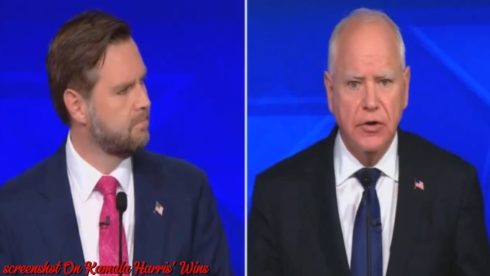Tuesday night’s vice-presidential debate between Republican JD Vance and Democrat Tim Walz was a striking departure from the heated and often chaotic presidential debates seen earlier in the year. Held on a CBS News stage in New York, the 90-minute exchange saw both candidates focus on the key issues that matter to voters ahead of the November 5 election. However, instead of directly attacking each other, they spent more time criticizing their respective running mates.
For JD Vance, the Ohio senator who aligns closely with Donald Trump, the debate offered a chance to present conservative populism with a softer tone. In contrast, Tim Walz, the Democratic governor of Minnesota, took a more cautious approach, eventually gaining momentum when discussing social issues like abortion and the Capitol riot. Despite the civility, a few moments of tension underscored the candidates’ differing positions on the future direction of the country.
Policy and Civility: A Debate Unlike the Presidential Showdowns
The vice-presidential debate was a sharp contrast to the fiery presidential debates seen earlier in the campaign season. JD Vance, a polished speaker, and Walz, with his folksy style, largely avoided personal attacks and instead focused on issues that resonate with the American public. One of the key moments came when Walz spoke about his experience with gun violence, referencing his 17-year-old witnessing a shooting. Vance responded with genuine concern, showcasing the unusual civility in the debate.
Throughout the discussion, the two men found areas of agreement, with Walz stating, “There’s a lot of commonality here,” a phrase rarely heard in today’s polarized political landscape. However, the debate was not without its contentious moments. JD Vance bristled at times, particularly when he felt fact-checked unfairly by the moderators. Yet, both candidates maintained a generally respectful tone, with even-tempered exchanges dominating the night.
Cordial with Clashes: Disagreements on Trump and January 6
Despite the overall polite nature of the debate, the topic of Donald Trump’s claims about the 2020 election ignited the most heated exchange of the evening. When pressed on whether Trump lost the election, Vance dodged the question, instead criticizing Vice President Kamala Harris for alleged censorship. Walz quickly seized the opportunity to point out what he called a “damning non-answer,” emphasizing the seriousness of Trump’s attempts to overturn the election results.
Walz went further, highlighting the absence of former Vice President Mike Pence from the debate stage as a result of his role in certifying President Joe Biden’s victory. Vance, while generally affable throughout the night, was notably silent on this point, underscoring his unwavering loyalty to Trump. This moment revealed the deeper ideological divisions between the two candidates, particularly on issues of democracy and election integrity.
Contrasting Styles: JD Vance’s Smooth Delivery vs. Walz’s Grassroots Appeal
From the start of the debate, Vance appeared more at ease, delivering polished responses that were relentlessly on-message. He repeatedly reminded voters that the Democrats had controlled the White House for nearly four years, framing the debate as a referendum on their policies. In contrast, Walz appeared less comfortable initially, especially when discussing foreign policy, an area outside his usual expertise. However, he found his footing as the conversation shifted to domestic issues like abortion and immigration.
JD Vance’s media experience was evident, as he deftly handled accusations regarding his controversial comments about Haitian immigrants. Meanwhile, Walz’s responses highlighted his desire for bipartisan solutions, particularly on immigration reform. While JD Vance’s more polished style may have resonated with voters seeking a firm, authoritative voice, Walz’s authenticity and grassroots appeal likely struck a chord with middle-American voters.
Will the Debate Shift the Race? Historical Context Offers Insight
Historically, vice-presidential debates have rarely shifted the outcome of elections. The 1988 debate between Democrat Lloyd Bentsen and Republican Dan Quayle is often cited as an example where a decisive debate victory had little impact on the final result. Despite Bentsen’s strong performance, Quayle went on to serve as vice-president after his ticket won in a landslide. Tuesday night’s debate may well follow a similar path.
However, the debate did offer key insights into the future political prospects of JD Vance. At just 40 years old, Vance has proven his ability to articulate conservative values on a national stage, suggesting he could be a rising star within the Republican Party. Walz, for his part, did no harm to the Democratic ticket and showcased the qualities that made him a vice-presidential pick. But in the end, it was Vance’s commanding performance that may leave a lasting impression, buoying Republican confidence as Election Day approaches.














